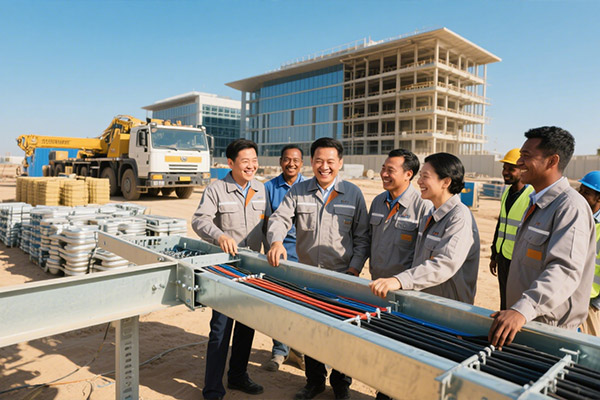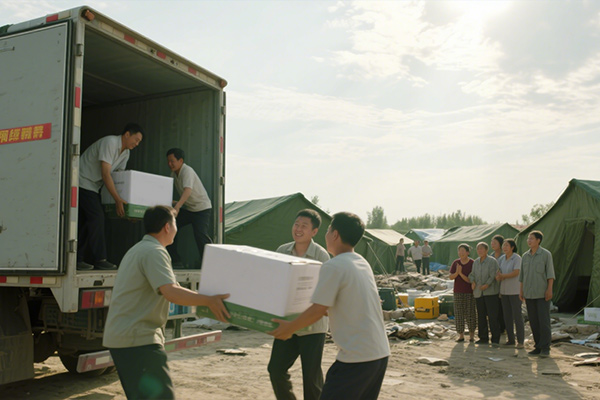Jakarta After 8 months of technical breakthroughs and multiple rounds of rigorous testing, Hebei Yidian Import and Export Trading Co., Ltd. successfully won the bid for the cable bridge project of Jakarta Metro Line 3 in Indonesia. As the first subway line in Southeast Asia to pass through tropical rainforests and coastal ecological zones, the project is 46 kilometers long, of which 28 kilometers of the road section needs to cope with complex environments such as 3,200 hours of strong ultraviolet radiation per year, 95% humidity and salt spray corrosion, which poses a high challenge to the durability of the cable bridge.
Customized solutions to overcome multiple technical barriers
In view of the unique climatic conditions of the project, the Yidian technical team developed a combined solution of “FRP pipe box + 316L stainless steel bridge”:
FRP pipe box: It adopts orthophthalic unsaturated polyester resin and alkali-free glass fiber winding process, and adds UV-531 anti-ultraviolet additive on the surface. After 1000 hours of QUV aging test, the tensile strength retention rate reaches 95%, which is suitable for signal cable protection in rainforest sections;
Stainless steel bridge: It uses 316L austenitic stainless steel, and the surface is electrolytically polished. There is no pitting in the salt spray corrosion test (NSS) for 500 hours. It is specially designed for power cables in coastal sections and can withstand high corrosion environments with Cl⁻ concentrations exceeding 5000ppm.
Stainless steel bridge: It uses 316L austenitic stainless steel, and the surface is electrolytically polished. There is no pitting in the salt spray corrosion test (NSS) for 500 hours. It is specially designed for power cables in coastal sections and can withstand high corrosion environments with Cl⁻ concentrations exceeding 5000ppm.
The solution has passed the Indonesian National Industrial Standard (SNI) certification and became the first Chinese bridge product to meet both SNI 01-2207-2019 (corrosion resistance) and SNI 03-1721-1992 (UV resistance).
Full-process service to ensure project implementation
To ensure the project is delivered on schedule, Yidian launched the “dual-base collaborative production” model: the Hengshui base is responsible for the large-scale production of FRP pipe boxes, with a monthly production capacity of 1,200 tons; the Haiphong factory in Vietnam is responsible for the local processing of stainless steel bridges, shortening the transportation cycle by 30%. At the same time, the company set up a temporary service station in Jakarta, equipped with 3 certified engineers to provide on-site installation guidance, ensuring that the installation error of each meter of bridge is controlled within ±2mm.
“Yidian’s solution not only meets the performance standards, but also demonstrates a deep understanding of the Southeast Asian market.” The project owner’s representative said, “Its UV-resistant design reduces costs by 25% compared to European and American competing products, while its corrosion resistance is improved by 15%, which is of great reference value for infrastructure projects in tropical countries.”
Opening up a new growth pole in Southeast Asia’s rail transit market
This winning bid is the first major breakthrough for Yidian in the field of rail transit in Southeast Asia, and is expected to drive a 30% increase in market orders in countries surrounding Indonesia (Malaysia, Thailand, and the Philippines). According to industry reports, investment in urban rail transit in Southeast Asia will exceed US$80 billion from 2025 to 2030, of which 60% of the projects are located in high-humidity and high-corrosion areas. Yidian’s technological advantages are in line with the needs of this market segment.
The company’s international business director said: “The Jakarta Metro project will become our ‘mobile business card’ in Southeast Asia. In the future, we will launch a ‘smart bridge’ solution with integrated photovoltaic power supply and intelligent monitoring based on the characteristics of tropical cities, and promote the deep integration of Chinese technology and Southeast Asian infrastructure needs.”
This breakthrough not only consolidates Yidian’s leading position in the markets along the “Belt and Road”, but also marks the transformation of Chinese cable tray companies from “price competition” to “technology leadership”, providing a successful paradigm for more Chinese high-end equipment to enter global complex environment projects.



